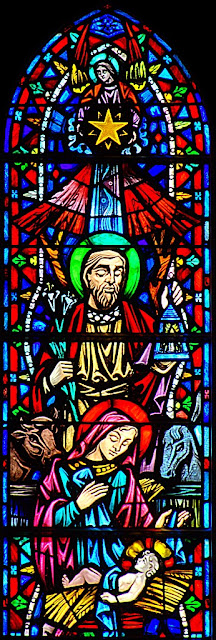 |
| The Power of God’s Word is seen when Jesus raised Lazarus from the dead by simply saying, “Lazarus, come out.” (John 11) |
“For as the rain and the snow come down from heaven and do not return there but water the earth, making it bring forth and sprout, giving seed to the sower and bread to the eater, so shall my word be that goes out from my mouth; it shall not return to me empty, but it shall accomplish that which I purpose, and shall succeed in the thing for which I sent it.”
(Isaiah 55:10-11)
Words are very often seen as weak, malleable things that can be twisted and turned into unrecognizable things bearing little resemblance to their original meaning. You know it is bad when even in literature words are disparaged. In William Shakespeare’s Hamlet, Polonius sees Hamlet reading a book and asks, “What do you read, my lord?” and Hamlet answers, “Words, words, words.” Which is to say, the content of the words doesn’t matter – they are just words.
The problem isn’t with words themselves. When used properly, words can be used for great things even in this sinful world. The problem is that sinful people misuse words. Sinners use words to lie, cheat, and twist and spin the truth. Even when people speak the truth, people can ignore good words. This all makes words seem weak and ineffective.
 |
| All people are descended from Adam and Eve. God created one race of people and two sexes. There still remains one race and two sexes. |
Sinners go to great lengths to justify their sin to themselves. Thieves say, “I didn’t steal that thing which didn’t belong to me. I just ‘borrowed’ it.” Or adulterers say, “I didn’t cheat or betray my wife (or husband, as the case may be), it was true love.” Well, “love” is a powerful word. Who can be against “love”? But when “love” is used to justify even the worst kind of betrayal or all kinds of sexual perversions, then it is just a “word”.
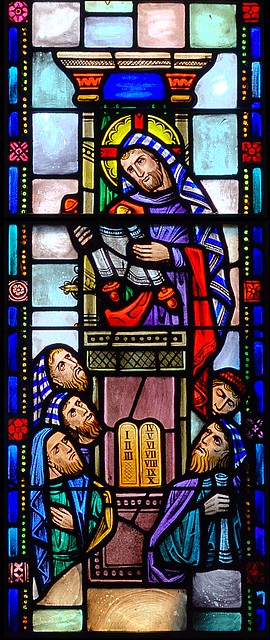 |
| Jesus taught God’s Word, and many people heard it and were saved, but some did not believe and were condemned. |
God does not misuse words. God does not lie or twist the truth when He speaks. God’s Word can be trusted and relied upon to be true at all times and in all places. More than that, God’s Word has power to do what it says. In Isaiah 55, God tells us, “My Word goes out from my mouth (and) will not return to me empty, but will accomplish what I desire and achieve the purpose for which I sent it.”
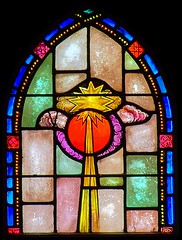 |
| God said, “Let there be light,” and there was light, and the light was good. |
Even when Adam and Eve rebelled against God and ate the forbidden fruit, God came to them that very day and had mercy on them and in cursing the serpent, God promised to send an offspring of the woman to crush the head of the serpent, and bring salvation to people. God kept His promise, and Jesus came as the Son of God to fulfill the law in our place, and to pay the price for our sin, which is death. In doing this, Jesus won our forgiveness and eternal salvation. God’s promises are not like the promises of wicked and devious sinners. God’s promises can be trusted.
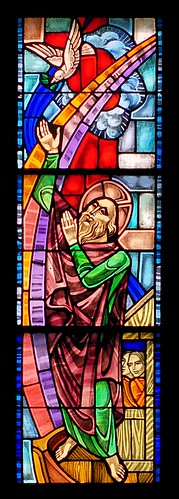 |
| God remembered His promise to Adam and Eve,and saved Noah and his family from the great flood. |
One day when Jesus had entered the city of Capernaum (Matthew 8:5-13), a centurion came to Him and asked Him to heal his servant who was paralyzed and suffering. Jesus said, “I will go and heal him.” The centurion said to Jesus, “Lord, I do not deserve to have you come under my roof. But just say the word, and my servant will be healed. For I myself am a man under authority, with soldiers under me. I tell this one, ‘Go,’ and he goes; and that one,’Come,’ and he comes. I say to my servant, ‘Do this,’ and he does it.” Jesus was astonished at the faith of the centurion, and said, “Go! It will be done just as you believed it would.” And his servant has healed at that very hour. A centurion’s word can command his soldiers and servants, but the Word of Jesus can command healing and bring life where there is death. Jesus also raised Lazarus from the dead by calling out to his grave, “Lazarus come out.” At the word of Jesus, Lazarus was given life after being dead four days. (John 11)
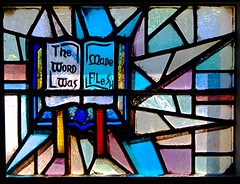 |
| Jesus is the Word of God made flesh. |
God’s Word is eternal, and God will never forget or take away his promised forgiveness and salvation. Psalm 105:8 says, “(The Lord our God) remembers His covenant forever, the word He commanded, for a thousand generations.” Isaiah (40:8) prophesies, “The grass withers and the flowers fall, but the word of our God stands forever.” So when God’s Word says, “Believe in the Lord Jesus, and you will be saved.” You can know that Jesus will save you, because he remembers and keeps His promises forever.
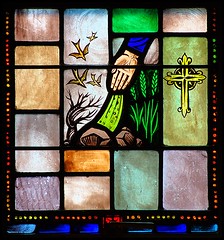 |
| God’s Word is freely spread among all people, like a farmer throwing seed all over his land so that everyone who believes in Jesus will be saved. |
I wondered above why God would use something as weak as words to bring to us our salvation, but it is by God’s grace that He uses words to bring this great treasure to us here today. Because words are weak they can be rejected. Anyone who doesn’t want Christ’s forgiveness and salvation can reject it. God won’t force anyone to receive His salvation. He gives it as a free gift. So those who are saved are saved completely by the work of Christ without any help or cooperation on our part. Those who are condemned, on the other hand, are condemned by their own doing.
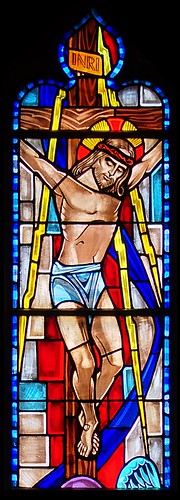 |
| God’s Word was made flesh in Jesus but He had to live in obedience to the Father, and suffer and die to save us from our sins. |
Isaiah 55:10-11 says, “As the rain and the snow come down from heaven, and do not return to it without watering the earth and making it bud and flourish, so that it yields seed for the sower and bread for the eater, so is [God’s] word that goes out from [His] mouth: It will not return to [Him] empty, but will accomplish what [He] desire(s) and achieve the purpose for which [He] sent it.” God’s purpose and desire is that you believe in Jesus and receive His salvation, and live with Him in Paradise forever. Jesus is your life and your salvation. He is the truth that saves you. We thank and praise Him for His Word that brings to us this precious gift.

